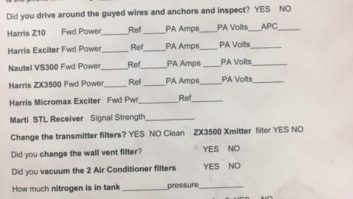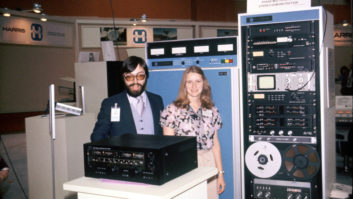Numerous readers wrote to Radio World in response to Mark Persons’ column about the future of engineering in the May 9 issue. Selections:
An Investment, Not Just an Expense
The ranks of radio engineers are getting smaller every year. I keep hearing this over and over again from people in radio.
To find and keep your next engineer, offer a good compensation package; be considerate of the times he (or she) has to work overnights; and allow for time off the next day.

To find engineers, you can start at the SBE website, www.sbe.org, which list job openings. You can also look at the list of local SBE chapters in your area on that website and ask the local chapter if they know of an engineer looking for work. You might ask other radio station engineers in your market if they know of someone who might be interested in your opening.
Before you offer someone a job at your station or group, take a look at what other engineers are getting paid, via this recent Radio magazine survey (find the link at radioworld.com/July-04-2012).
Remember: Engineering is an investment, not a dreaded expense.
Steve Tuzeneu
Director of Engineering
Sonshine Media LLC
Abilene, Kan.
The Pay Is the Problem
I can explain the basic nature of the problem in one word: pay. I tell kids that I’ve been working in the business for 30-some years with a master’s degree in EE, and what I am making; and their jaws drop. “I could make that much fixing computers right out of high school,” they say. And they can.
People with good troubleshooting skills are in demand in all industries, and they are becoming harder and harder to find. As they keep getting harder to find, broadcast engineering salaries stagnate. Pretty soon all of the old generation of engineers will die off without passing their skills on.
Many in the older generation learned electronics and diagnosis methods in the military, a route that now no longer exists because military electronics are seldom repaired at the component level in the field and at the depot. Perhaps then, when skilled people are simply no longer available, salaries will begin to climb to levels comparable to other industries.
Scott Dorsey
Owner
Kludge Audio
Williamsburg, Va.
Who Values Engineers?
Over the course of 44 years in the field, I have become aware of Mark Persons and all that he has done to be the voice of those of us who toil in obscurity to keep the music, news, weather and sports — and commercials — flowing.
Mark succinctly has asked us why there are so few people who want to become broadcast engineers. He notes that wannabe engineers aren’t getting the technical training they need and muses that it might be because people are now focused on designing equipment.
He also correctly notes that stations are trying to have engineers do transmitting and studio systems as well as IT work, which includes maintaining the computer network.
But let’s put this into proper perspective: The fault lies squarely in Washington and the FCC, which doesn’t value engineers and small operations.
I am “retiring” from broadcasting this summer and moving on to other, more lucrative endeavors where I can at least enjoy respect and make enough money to pay my bills.
David C. Schaberg
Radio Consultant
Lansing, Mich.
It’s Not Just Engineers
Mark Persons is a valuable asset to many broadcasters in the upper Midwest. If I came across a radio station at which Mark had been the contract engineer, I knew I was looking at one that was technically sound.
Mark laments the shortage of new, young folks coming into the engineering ranks. Unfortunately the radio industry is facing the challenge in many job categories. And I don’t see a soon-to-be solution.
Back in the 1950s and ’60s — when Mark and many others of us were aspiring to learn, conquer and enjoy a career in radio — there were local station owners and managers who came from the “ranks” of radio types, who many times had learned the biz on the job. A good share of them would have been willing to do radio even if they weren’t paid. And I guess we could agree: Some were not paid very well.
Today’s radio station management is hired for the ability to generate cash flow. In a good share of the companies that own radio properties, this includes many phones calls per day to a superior and to headquarters. The paperwork and reports involves yet another person. Managers are dedicated to holding their jobs, which often means communicating with the home office way too often. At least that’s what I have observed.
Mark suggests that “older engineers” could mentor these youngsters. It’s really a responsibility of all our staff and all ages. Thanks, Mark, for nudging us to address the issue.
Dean Sorenson
Sioux Falls, S.D.
Difficult? Almost Impossible
I’ve built and operated 17 radio stations myself and now develop new facilities for others. The most difficult position to fill was always that of engineer.
Now, difficult approaches impossible. One of the most common questions is whether I know of an engineer who can help in a particular market; the caller can’t find one. Often, neither can I.
Jerry J. Collins
President
F & L Broadcast Development Corp.
Lake San Marcos, Calif.
A Unique Breed
New Jersey is heavily involved in STEM education (science, technology, engineering and math); my alma mater, The College of New Jersey, holds a STEM conference every spring.
Getting young people involved in electrical engineering is a challenge. Besides erasing the stigma that engineers are responsible for the world’s technological ills, our other challenge is restoring industrial arts education into the secondary schools. (You don’t want me to get started on that topic!)
My local ham radio club (www.w2zq.com) has been running informal classes to teach new or less experienced hams how to do practical things like solder, apply RF connectors, design and assemble antennas. These skills are no longer taught in junior high school or high school.
The kinds of engineers you and I deal with in the broadcast industry are not the laboratory or armchair engineers who never get their hands dirty. Broadcast engineers not only have to have a strong foundation in electronics and FCC regulations, but also have hands-on practical experience with power distribution, telephone systems, plumbing, even mowing the grass.
Broadcast engineers are a unique breed with a panoply of skills, most of which are taught by the mouth-to-ear method of mentoring (can you hear me, Ron Simpson and Larry Will?). I don’t see how we can replenish these engineers unless the secondary schools come around to a new way of thinking.
I’m going to share Mark’s article with my colleagues.
Robert Schroeder
Carversville, Pa.
The author is founding chapter chairman of the IEEE Education Society’s Princeton/Central Jersey Section. He recently retired as communications and warning officer for the New Jersey Office of Emergency Management.
Zero Applications
We’re a high-tech station with high standards in a small market. Since consolidation took place in the ’90s and the digital transition hit in 2009, I’ve had zero applications from qualified people with reasonable wage requests. I’ve had no minorities in well over 20 years.
The best I can do is look for someone who maybe is laid off from a factory job in maintenance, and perhaps they have a ham ticket or mess around with electronics. But finding someone in Market 191 with a General Radio-Telephone or SBE credentials is like trying to find an honest politician.
Frederick R. Vobbe
Vice President/Chief Operator
WLIO Television
Lima, Ohio
A Cryin’ Shame
“Where Have All the Engineers Gone” literally brought a tear to my eye. I, too, am one of those now-gone broadcast engineers who among other positions spent 30 years at KTTV (aka Fox 11) from the era when it was Metromedia.
I’m 70 now and planned to retire at 65 to follow my dream. But my then boss and close friend asked me to hang in through the digital conversion. So what was supposed to be just five months turned into more than a year, and by the time I completed my office job, there was no maintenance department to return to.
In my case, I was lucky. I had for years been a relief operator in TOC so I asked if I could work my last seven weeks there.
As to the overall industry, as far as I can tell most staff engineers have been fired and replaced by outside contractors who will charge by the repair rather than being a day-to-day cost of doing business.
Today’s management mentality, in all aspects of broadcasting, is that computers can do anything people can. It’s funny, though. I thought I would miss the job, but I don’t. It’s the people I miss: those 30 years of friendships that made us a large, extended family.
These are the words I spoke at my retirement party in 2009: “When I came to Los Angeles in the early 1970s, the No. 1 song on the radio was the Captain and Tennille’s cover of ‘Love Will Keep Us Together.’ Now I predict it won’t be love that will keep us together. It will be Facebook.”
How right I was on that one.
Bill Pasternak, WA6ITF
Editor
Amateur Radio Newsline Inc.
Saugus, Calif.





